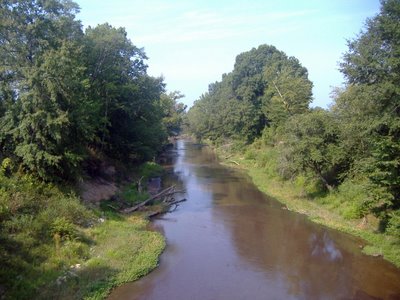The Yocona River
 |
| Yocona River, Old River Road, Anchor/Taylor, Mississippi. |
In northern Mississippi, running across the southern part of Lafayette County, the Yocona River is the principal tributary for Enid Lake. Based on an earlier variation of the name, the river is called YOCK-NEE by the locals. William Faulkner, in his novels, called it the Yoknapatawpha River (from which he seems to have extrapolated his Yoknapatawpha County). It's my understanding that not far upstream from the place pictured above, a military battle took place during the Civil War. That battle is especially noteworthy because the Union forces were commanded by none other than Ulysses S. Grant.
In my younger years, I swam* in this river, fished from its banks, and when the water was up, even rode a boat up and down into Enid Lake (from Jones Crossing, south of Grinder's Switch). Using various bridges, I've driven over this river thousands of times. I've repeatedly seen it flood its banks, but I've never seen it run dry. Over the years, I've heard both funny and sad stories associated with the river. I've even dreamt about it. All that said, I'm not really a fan of bodies of water, moving or still. And yet for some reason, this old river - the Yocona River - seems always to run through the recesses of my mind.
But there is something else about this river. I have a strong intuition that the Yocona River works symbolically for me as a type. To explain from the Bible, Simon Peter identified Noah's Flood as a type (or picture) of baptism (1 Peter 3:21). The brazen serpent that was lifted up in the wilderness was identified by Christ as a type representing His crucifixion (John 3:14-15). So for me, the Yocona River can also serve as a type. How? Because it typifies the Bible itself. The Bible is the metanarrative that runs through and beneath Southern culture in general and my life in particular. I don't mean that Southerners even come close to living up to biblical precepts. Rather, I mean the Bible acts as a theological structure that underpins Southern culture. Here I defer to the late Southern writer, Flannery O'Conner, who said:
"Whenever I'm asked why Southern writers particularly have a penchant for writing about freaks, I say it is because we are still able to recognize one. To be able to recognize a freak, you have to have some conception of the whole man, and in the South the general conception of man is still, in the main, theological. . . . I think it is safe to say that while the South is hardly Christ-centered, it is most certainly Christ-haunted. The Southerner . . . is very much afraid that he may have been formed in the image and likeness of God."
And just like the Yocona River, I've never known this metanarrative to run dry. It's always there, and sometimes it still floods its banks and overwhelms everything in its path. I leave it to the reader to decide whether this is a good or bad thing.** I can only attest that in my life, it is undeniably true.
*We called it "swimming," but it was really nothing more than wading and splashing around in the river when the water was low.
**There is a debate even among Christians about whether cultural Christianity is desirable. And while that might be a worthwhile discussion, the emphasis of this post concerns only what is, not what should or should not be.
Labels: Flannery O'Conner, Lafayette County Mississippi, Ulysses S. Grant, William Faulkner, Yocona River, Yoknapatawpha County
